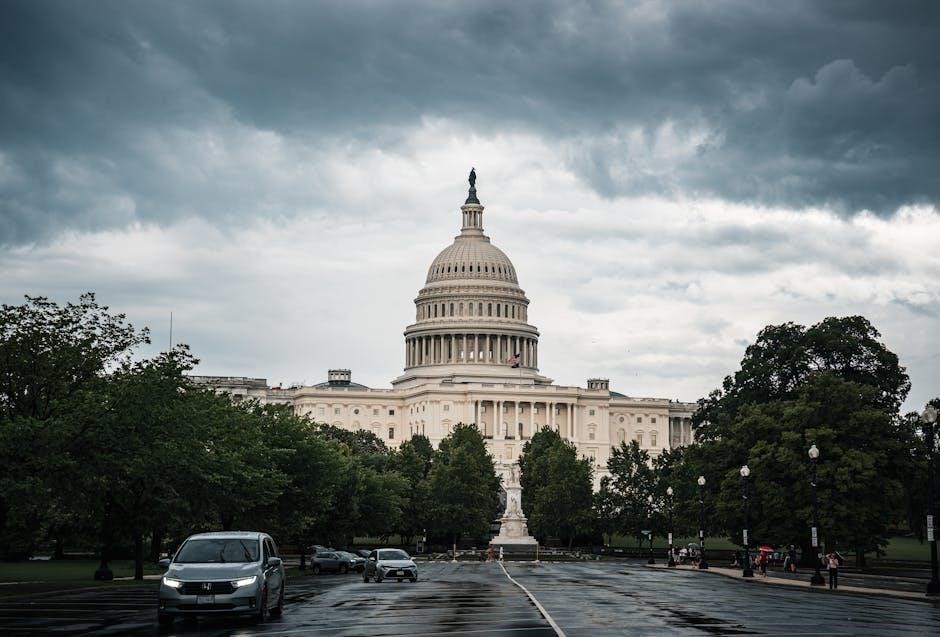Sam Harris’s Free Will challenges the concept of free will, arguing it is an illusion. He contends that our choices are determined by prior causes, not conscious control, while emphasizing that this understanding does not undermine morality or freedom.
Overview of the Book
In Free Will, Sam Harris presents a compelling case against the existence of free will, blending neuroscience, philosophy, and psychology. He argues that our decisions and actions are the result of prior causes beyond our control, making free will an illusion. Harris challenges the belief that humans possess conscious control over their choices, citing scientific evidence to support his claims. The book explores how neurotransmitters, genetics, and external factors shape behavior, undermining the concept of moral responsibility. Harris emphasizes that rejecting free will does not negate morality or social freedom but encourages a more compassionate and realistic understanding of human behavior. Written in an accessible style, the book aims to provoke thought and redefine how we view agency, ethics, and personal responsibility in a world without free will.
The Central Argument: Free Will as an Illusion
Sam Harris’s central argument in Free Will posits that free will is an illusion. He asserts that human decisions and actions are entirely determined by factors such as genetics, environment, and past experiences, over which individuals have no control. Harris emphasizes that consciousness does not initiate decisions but merely observes them after they have been made. This perspective aligns with a hard determinist viewpoint, where every event, including human behavior, is the inevitable result of prior causes. Harris argues that the sense of agency we experience is deceptive, as our choices are ultimately governed by neural processes that operate outside of conscious awareness. By challenging the notion of free will, Harris seeks to redefine how we understand moral responsibility and justice in society.
Key Themes and Concepts
Key themes in Free Will include the illusion of free will, the role of neuroscience, and the implications for morality. Harris explores how neuroscience reveals that decisions are made subconsciously, challenging the idea that we have conscious control. He differentiates between determinism and libertarianism, arguing that determinism aligns with scientific understanding. Harris also examines the impact of prior causes on decision-making, emphasizing that our choices are shaped by factors beyond our control. A central concept is the incoherence of free will, where Harris argues that the idea is logically inconsistent. He further discusses how rejecting free will affects moral responsibility, justice, and societal norms, advocating for a more compassionate approach to ethics and punishment. These themes collectively challenge traditional views of human agency and moral accountability.

The Concept of Free Will
The concept of free will refers to the ability to make choices unconstrained by external factors. Sam Harris argues it is an illusion, as decisions are shaped by prior causes rather than conscious control.

Defining Free Will
Defining free will involves understanding its core concept: the ability to make choices unconstrained by external factors. Sam Harris argues it is an illusion, as decisions are shaped by prior causes rather than conscious control. The concept hinges on the idea of moral responsibility, implying that individuals are the ultimate authors of their actions. Harris challenges this view, asserting that neuroscience and determinism reveal that choices are the result of brain processes beyond conscious awareness. This perspective shifts the focus from moral blame to understanding the underlying causes of behavior. Harris’s definition emphasizes that free will, as traditionally conceived, does not exist, and this realization has profound implications for morality and justice.
Historical Perspectives on Free Will
The debate over free will has spanned centuries, with philosophers and theologians exploring its nature. Early thinkers like Augustine and Leibniz framed free will within religious and metaphysical contexts, while Enlightenment figures such as Kant sought to reconcile it with moral responsibility. In modern times, the rise of determinism and compatibilism has reshaped the discussion. Sam Harris builds on these historical perspectives, arguing that scientific advancements, particularly in neuroscience, challenge traditional views of free will. He aligns with determinism, asserting that human behavior is the result of prior causes rather than conscious choice. This stance draws criticism from libertarians, who argue for an indeterminate free will. Harris’s work reflects a shift toward empirical understanding, grounding the free will debate in observable reality rather than abstract philosophy.
Philosophical Debates Surrounding Free Will
Philosophical debates on free will center on determinism, libertarianism, and compatibilism. Determinists argue that all events, including human decisions, are caused by prior factors, negating free will. Libertarians claim that true free will requires indeterminacy, where choices are not entirely predetermined. Compatibilists propose that free will can coexist with determinism if individuals act according to their own desires. Sam Harris rejects libertarian free will as incoherent, asserting that our choices are entirely determined by factors like genetics and environment. He aligns with hard determinism, maintaining that moral responsibility must be reevaluated without the illusion of free will. Critics argue that rejecting free will undermines accountability, while Harris counters that understanding determinism fosters compassion and more ethical systems. This debate remains central to philosophy, ethics, and the sciences, with significant implications for justice and personal responsibility.

Sam Harris’s Argument Against Free Will
Sam Harris argues that free will is an illusion, contending that human decisions are entirely determined by prior causes, such as genetics, environment, and brain activity, over which we have no control.
The Role of Neuroscience in Understanding Free Will
Neuroscience plays a pivotal role in Sam Harris’s argument against free will, as it provides empirical evidence that human decisions are influenced by brain activity before conscious awareness; Studies using neuroimaging techniques, such as fMRI, have shown that brain regions often make decisions seconds before individuals report being consciously aware of them. Harris cites experiments by neuroscientists like Benjamin Libet, which demonstrate that neural processes initiate actions involuntarily, challenging the notion of conscious control. This scientific evidence suggests that free will is an illusion, as our choices are the result of deterministic brain processes rather than deliberate, self-caused decisions. By linking neuroscience to philosophy, Harris argues that understanding the brain’s role in decision-making undermines the traditional concept of free will, offering a more nuanced view of human behavior and moral responsibility.
Determinism vs. Libertarianism
Sam Harris’s Free Will engages deeply with the philosophical debate between determinism and libertarianism. Determinism posits that all events, including human decisions, are the inevitable result of prior causes, leaving no room for free will. Libertarianism, in contrast, argues for the existence of free will, contending that individuals can make choices that are not entirely determined by external factors. Harris aligns with a hard determinist perspective, asserting that libertarian free will is incoherent and unsupported by scientific evidence. He argues that our sense of agency is a subjective experience, but it does not reflect a genuine ability to choose otherwise. Harris’s rejection of libertarianism is central to his case against free will, emphasizing that human behavior is entirely the product of factors beyond our conscious control. This stance has significant implications for how we view moral responsibility and justice.
The Impact of Prior Causes on Human Decision-Making
Sam Harris argues that human decision-making is entirely influenced by prior causes, such as genetics, environment, and past experiences. These factors shape our thoughts, desires, and choices, often operating beneath conscious awareness. Harris emphasizes that our decisions are the result of neural activity in the brain, which occurs before we are consciously aware of them. This challenges the idea of free will, as our choices are not truly under our control. The brain’s functioning, influenced by countless external and internal factors, determines our actions. Harris asserts that even if we feel like we are making intentional decisions, these feelings are illusions created by the brain’s processes. This perspective fundamentally shifts how we understand human behavior, morality, and responsibility, as it suggests that our choices are ultimately the product of causes beyond our conscious control.

The Illusion of Free Will
Sam Harris contends that free will is an illusion, supported by neuroscience showing brain activity precedes conscious decisions. This challenges traditional notions of moral responsibility and control.
Neuroscientific Evidence Challenging Free Will
Neuroscientific studies, such as those by Libet, demonstrate that brain activity often precedes conscious decision-making. Harris argues that this indicates choices are not truly under conscious control, undermining free will. Functional MRI scans reveal neural patterns that predict decisions before individuals are consciously aware of them, suggesting a deterministic process. Such findings challenge the idea of free will by showing that our consciousness may merely observe decisions rather than initiate them. Harris uses this evidence to assert that human behavior is the result of prior causes, not conscious choice, thereby refuting the existence of free will.
Consciousness and the Sense of Agency
Sam Harris examines how consciousness creates the illusion of agency, making us feel we control our decisions. He argues that this sense of control is misleading, as consciousness merely observes processes it does not initiate. The brain’s neural activity often dictates actions before conscious awareness, suggesting decisions are not freely made. Harris emphasizes that consciousness is a passive observer, not an active decision-maker, challenging the notion of free will. This perspective alters how we view moral responsibility, shifting focus from blame to understanding the underlying causes of behavior. Harris’s analysis bridges neuroscience and philosophy, offering a compelling case against the existence of true free will while maintaining the importance of ethical considerations.
The Incoherence of the Concept of Free Will
Sam Harris argues that the concept of free will is fundamentally incoherent when examined through the lens of neuroscience and philosophy. He posits that for free will to exist, individuals must have complete control over their thoughts, desires, and choices. However, Harris points out that these elements are influenced by factors such as genetics, environment, and past experiences, which are beyond personal control. This determinism undermines the notion of free will, making it an illusion. Harris further asserts that the idea of free will is incompatible with both deterministic and random universes. By challenging the coherence of free will, Harris encourages a reevaluation of moral responsibility, emphasizing compassion and understanding over traditional notions of blame and punishment.

Moral Responsibility and Free Will
Sam Harris examines the connection between free will and moral responsibility, arguing that rejecting free will transforms how we view ethics and accountability.
The Relationship Between Free Will and Morality
Sam Harris explores how free will influences moral judgment, arguing that its illusion challenges traditional notions of ethical responsibility. He maintains that morality remains intact without free will, emphasizing that actions can still be right or wrong regardless of determinism. Harris suggests that moral responsibility should focus on understanding the causes of behavior rather than assigning blame. This shift in perspective encourages a more compassionate and rational approach to ethics, where individuals are seen as products of their circumstances. By rejecting free will, Harris advocates for a morality grounded in empathy and the pursuit of well-being, rather than in the concept of personal choice.
Rethinking Moral Responsibility in a Deterministic World
Sam Harris proposes a reevaluation of moral responsibility in a world without free will, emphasizing that our actions are the result of prior causes. He argues that traditional notions of blame and punishment must be replaced with a focus on understanding and rehabilitation. Harris suggests that recognizing the deterministic nature of human behavior fosters a more compassionate society, where individuals are seen as products of their environment and genetics. This perspective shifts the emphasis from retribution to prevention, aiming to address the root causes of harmful actions. By aligning moral responsibility with the reality of determinism, Harris advocates for a system that prioritizes human well-being and long-term societal benefit over punitive measures.
The Implications for Justice and Punishment
Sam Harris examines how rejecting free will reshapes justice and punishment, advocating for a shift from retribution to rehabilitation. He argues that without free will, punitive measures should focus on preventing future harm rather than punishing past actions. Harris suggests that understanding the deterministic causes of behavior can lead to more effective interventions, such as rehabilitation programs and mental health support. This approach aims to reduce recidivism and promote societal safety. Harris also critiques the notion of moral desert, questioning whether individuals truly “deserve” punishment. By aligning justice with the realities of human behavior, he envisions a system that prioritizes compassion, understanding, and practical outcomes over vengeance. This perspective challenges traditional legal frameworks and encourages a more humane approach to criminal justice.

The Implications of Rejecting Free Will
Rejecting free will fundamentally reshapes our understanding of human behavior, responsibility, and ethics, urging a shift toward compassion and practical solutions over traditional notions of blame and guilt.
How Rejecting Free Will Changes Our Understanding of Human Behavior
Rejecting free will reshapes our view of human behavior by emphasizing determinism—actions are the result of prior causes, not conscious choices. This perspective shifts blame to factors like genetics, environment, and past experiences, fostering empathy over punishment. Harris argues that understanding behavior as deterministic can lead to more effective societal systems, focusing on rehabilitation rather than retribution. It also challenges traditional moral frameworks, encouraging a more compassionate approach to wrongdoing. By acknowledging the illusion of free will, we may develop better strategies for personal growth and societal improvement, aligning our actions with a clearer understanding of human nature and its influences.
The Future of Ethics Without Free Will
Without free will, ethics must evolve to focus on well-being and flourishing rather than moral blame. Harris advocates for a science-based approach to ethics, rooted in human values and the reduction of suffering. By understanding behavior as the result of prior causes, we can design systems that nurture positive outcomes and address root causes of harm. This shift could lead to more compassionate policies, prioritizing education, mental health, and social support. Ethics would become a practical pursuit, aiming to create conditions where individuals and societies thrive. Harris emphasizes that rejecting free will does not diminish moral responsibility but redirects it toward fostering a better world through empathy and evidence-based interventions.

Societal and Cultural Implications of Denying Free Will
Denying free will challenges societal structures like justice, education, and personal responsibility. Harris argues that recognizing our lack of free will could foster empathy, reducing punitive approaches in favor of rehabilitation. Culturally, it may shift how we view success and failure, emphasizing systemic influences over individual merit. This perspective could reshape policies, focusing on prevention and support rather than punishment. Harris suggests that understanding behavior as deterministic can lead to more compassionate and effective societal interventions, ultimately fostering a more equitable and humane culture. By aligning our systems with the reality of human behavior, we can address root causes of societal issues more effectively.

Critiques and Counterarguments

Harris’s arguments have faced philosophical and scientific challenges, with critics arguing that his determinism overlooks the complexity of consciousness and the potential for self-directed agency.
Philosophical Critiques of Harris’s Position
Leslie Allan critiques Harris’s rejection of free will, arguing that his hard determinism fails to account for the complexity of human agency. Allan contends that free will does not require absolute control over every factor influencing decisions but rather the ability to make choices that align with one’s desires and values. Critics also argue that Harris conflates determinism with libertarian free will, falsely assuming that rejecting one necessitates rejecting the other. Additionally, some philosophers challenge Harris’s assertion that moral responsibility is incoherent without free will, suggesting that accountability can still exist within a deterministic framework. These critiques highlight the ongoing philosophical debate over the coherence and implications of Harris’s arguments.
Scientific Challenges to Harris’s Arguments
Some neuroscientists and psychologists argue that Harris’s conclusions about free will oversimplify the complexity of brain function. While neuroscience provides valuable insights into decision-making processes, critics contend that the field is not yet advanced enough to definitively prove or disprove the existence of free will. Others challenge Harris’s interpretation of neuroimaging studies, such as Libet’s experiments, which he cites as evidence that consciousness does not initiate decisions. Critics argue that these studies have methodological limitations and do not fully capture the nuanced nature of human agency. Additionally, some scientists suggest that emerging research on neural plasticity and self-regulation may support the idea of a more dynamic and adaptive brain, potentially reconciling determinism with aspects of free will. These challenges highlight the ongoing scientific debate over Harris’s deterministic views;
Ethical Concerns About Rejecting Free Will
Rejecting free will raises significant ethical concerns, particularly regarding moral responsibility and justice. If our choices are entirely determined by prior causes, some argue that traditional notions of blame and praise become untenable. This challenges the foundation of legal systems, which often rely on the concept of intent and personal responsibility. Critics worry that denying free will could undermine social cohesion by eroding accountability. However, Harris counters that moral responsibility can still exist within a deterministic framework, focusing on rehabilitation rather than retribution. The ethical implications of rejecting free will extend to how society views punishment, justice, and personal agency, prompting a reevaluation of ethical frameworks in light of scientific insights.
Sam Harris’s Free Will compellingly argues that free will is an illusion, shaped by determinism. He challenges traditional moral frameworks, urging a shift in how we view responsibility and justice, while emphasizing the need for ethical systems aligned with scientific understanding.
Sam Harris’s central argument in Free Will is that free will is an illusion. He posits that human decisions and actions are the result of prior causes, such as genetics, environment, and past experiences, over which individuals have no control. Harris uses insights from neuroscience and philosophy to demonstrate that consciousness does not initiate actions but rather observes them after they have already been set in motion. He challenges the notion that humans possess a causal agency independent of determinism, arguing that this misunderstanding perpetuates flawed concepts of moral responsibility. Harris emphasizes that recognizing the illusion of free will does not negate the importance of morality or social freedom but rather encourages a more compassionate and realistic approach to ethics and justice.
The Significance of the Free Will Debate
The free will debate holds profound implications for understanding human behavior, morality, and justice. It questions whether individuals can be held morally responsible for their actions if those actions are predetermined by factors beyond their control. Sam Harris, in his argument, highlights that rejecting free will does not diminish human dignity but rather fosters a more empathetic society. The debate challenges traditional notions of blame and punishment, advocating for a shift toward rehabilitation and understanding. By engaging with this issue, we confront fundamental questions about the nature of consciousness, personal agency, and ethical responsibility. Ultimately, the free will debate encourages a deeper reflection on what it means to be human and how we should structure our moral and legal frameworks accordingly.
Final Thoughts on the Implications of Free Will
In concluding, the implications of rejecting free will, as argued by Sam Harris, are transformative. It reshapes our understanding of moral responsibility, shifting focus from punishment to rehabilitation. Harris emphasizes that acknowledging the illusion of free will fosters empathy and reduces harmful tendencies like blame and retribution. This perspective encourages a more compassionate society, where actions are seen as outcomes of prior causes rather than deliberate choices. By embracing this view, we can develop ethical systems grounded in understanding rather than judgment, leading to a more just and humane world. Ultimately, Harris’s arguments challenge us to reevaluate our beliefs about agency and morality, offering a pathway to greater societal harmony and individual well-being.